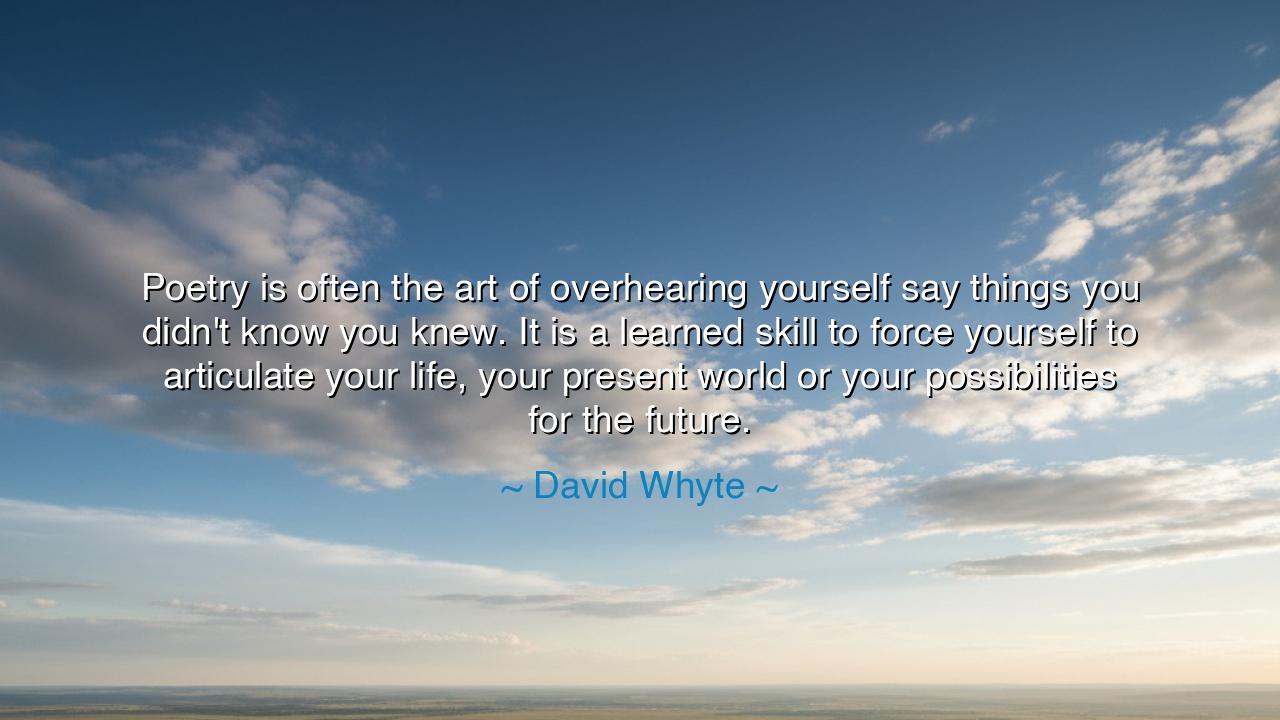
Poetry is often the art of overhearing yourself say things you
Poetry is often the art of overhearing yourself say things you didn't know you knew. It is a learned skill to force yourself to articulate your life, your present world or your possibilities for the future.






In the depths of the human soul, there are truths that we often fail to hear—truths hidden beneath the noise of our daily lives, waiting to be uncovered. David Whyte’s words, “Poetry is often the art of overhearing yourself say things you didn't know you knew. It is a learned skill to force yourself to articulate your life, your present world or your possibilities for the future,” speak to a profound truth: poetry is not just the creation of words, but the discovery of wisdom that resides within us, hidden in the quiet spaces of our being. Whyte’s insight suggests that poetry is a sacred art, a means of revealing what is often buried deep in the heart and mind, a practice of listening deeply to oneself.
In the ancient world, the oracle of Delphi was revered as a source of profound wisdom. But the greatest truths were often not spoken directly; they were found in the silences between words, in the enigmatic phrases that caused one to reflect and meditate. The great poets of ancient Greece, like Homer and Sappho, did not merely write for the sake of expression; they sought to unearth the hidden wisdom of the world, capturing the essence of the human experience. Poetry allowed them to articulate the unseen, to bring to light what was known but unspoken. In this way, poetry served as a mirror for the soul, reflecting not just what was outwardly visible but the inner workings of the heart.
The story of Socrates provides a powerful parallel. The philosopher often spoke of his "daimonion", a divine inner voice that guided him. Socrates did not claim to possess all wisdom, but he recognized the importance of listening to that inner voice that revealed truths beyond his conscious understanding. Poetry, much like Socratic introspection, allows one to overhear the unspoken truths that lie dormant within the self. It is through the discipline of expression, as Whyte describes, that we come to know ourselves and the world around us in ways we had not imagined.
In the same way, Rumi, the great mystic poet, often wrote from a place of mystery and revelation. His words flowed not from the intellect, but from the deeper soul, speaking of a union with the divine and the hidden beauty of existence. Rumi’s poetry was an act of listening to the universe within and without. His verses were the result of overhearing his own soul speak, of finding the language to articulate feelings and insights that could not be expressed in ordinary conversation. His poems, like those of many great poets, were not just written, but discovered, revealing truths that were always there but had not yet found their voice.
Whyte’s observation about learning the skill to articulate one’s life, present world, or future possibilities is crucial. Articulating one’s inner life, especially through poetry, is not a natural gift for all; it is a practice that requires patience, discipline, and vulnerability. In ancient times, the oral tradition was the primary means of passing down stories, wisdom, and culture. The bards and storytellers were trained in the art of expression, learning how to weave words that could convey not just events, but the very essence of human emotion and understanding. Poetry, then, was a learned skill, a way to bring clarity to the chaos of the world and to find meaning in life’s deepest mysteries.
The lesson here is clear: poetry is not merely the art of putting words on paper; it is a practice of listening to the soul’s whispers, to the truths that reside within us. To speak your truth, to articulate your life, to uncover the wisdom hidden in the silence, requires bravery and dedication. Whether through poetry, conversation, or reflection, we must cultivate the ability to listen deeply to ourselves and the world around us. In doing so, we will find the words to express what is often left unspoken, unlocking a deeper understanding of our past, our present, and our future.
As you navigate the journey of life, remember that poetry—in its many forms—is not just for the few who are born with artistic talents. It is a skill available to all who are willing to listen, to pause, and to articulate what is within them. Whether it is in a journal, in conversations with others, or in the quiet moments of reflection, the art of self-expression is the key to unlocking the mysteries of the soul. Take the time to overhear the wisdom within, and allow the act of articulating your life to be both a journey of self-discovery and a gift to those who listen.






AAdministratorAdministrator
Welcome, honored guests. Please leave a comment, we will respond soon